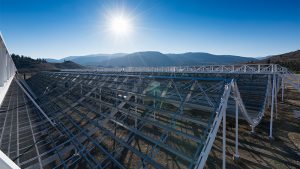The CHIME/FRB Team, which includes many researchers within the U of T Astronomy community – will be awarded the prestigious 2022 Berkeley prize by the American Astronomical Society (AAS).
The team is being honoured with the award for their noteworthy progress on fast radio burst (FRB) detections. They’ve discovered more than 500 in the first year of operations.
In particular, the CHIME/FRB team is being recognized for an article they published in Nature in November, 2020, that identified the first known FRB within our Milky Way Galaxy. The team tied the FRB flash to a potential source of a known magnetar, showing that at least some FRBs could originate from these remnants of massive stars.
The CHIME/FRB team who published this paper includes 13 members within the Dunlap Institute for Astronomy and Astrophysics and the David A. Dunlap Department of Astronomy and Astrophysics. The Lancelot M. Berkeley − New York Community Trust Prize for Meritorious Work in Astronomy will be accepted by Dunlap Institute Fellow Paul Scholz – who was the corresponding author on the Nature paper – along with Principal Investigator and McGill University Professor Vicky Kaspi.
Professor Keith Vanderlinde is a member of the CHIME/FRB collaboration. “This latest discovery is huge,” Vanderlinde says. “Magnetars are a great candidate explanation for (at least some) FRBs. Seeing a burst from one of our own galactic backyard means similar and even brighter events are a virtual certainty in the wider cosmos.”
For decades, FRBs have been a mystery to astronomers. Although the first one was discovered in 2007, only 140 had been detected – until recently. Using observations from the CHIME radio telescope in Penticton, the CHIME/FRB team has managed to detect hundreds more, including bursts from 18 repeating sources.
Team member and Dunlap Graduate Student Tomás Cassanelli says he is honoured by the receipt of the Berkeley Prize. “I’m very proud to be part of the international team responsible for this discovery,” he says. “CHIME has collected hundreds of FRBs and it is thanks to a team that work tirelessly monitoring the telescope and checking the data quality. All these measurements combined can tell us about the content of the Universe.”
The Berkeley prize is awarded annually for highly meritorious work in advancing the science of astronomy during the previous year. It is supported by a grant from the New York Community Trust. The prize includes a monetary award, as well as an invitation to give the closing lecture at the AAS’s winter meeting. This year, the prize will be awarded in January 2022, in Salt Lake City, Utah.
Last year, Science Magazine ranked the CHIME/FRB team’s research on FRBs as the second biggest scientific breakthrough of 2020, second only to the COVID-19 vaccine.
The CHIME project is co-led by the University of British Columbia, McGill University, the University of Toronto, and is hosted at the Dominion Radio Astrophysical Observatory by the National Research Council of Canada, with collaborating institutions across North America. The CHIME/FRB team consists of dozens of scientists.
________________________________________________________________________________________
For more information, please contact:
Meaghan MacSween
Communications and Multimedia Officer
Dunlap Institute for Astronomy & Astrophysics,
University of Toronto
meaghan.macsween@utoronto.ca
The Dunlap Institute for Astronomy & Astrophysics at the University of Toronto is an endowed research institute with more than 90 faculty, postdocs, students and staff, dedicated to innovative technology, ground-breaking research, world-class training, and public engagement. The research themes of its faculty and Dunlap Fellows span the Universe and include: optical, infrared and radio instrumentation; Dark Energy; large-scale structure; the Cosmic Microwave Background; the interstellar medium; galaxy evolution; cosmic magnetism; and time-domain science. The Dunlap Institute for Astronomy and Astrophysics, David A. Department of Astronomy & Astrophysics and the Canadian Institute for Theoretical Astrophysics comprise the leading centre for astronomical research in Canada, at the leading research university in the country, the University of Toronto.

